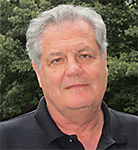Mark Jacobs in Current Issue of Driftwood Press Literary Magazine (Paraguay)
Driftwood Press is a new quarterly literary magazine published in Tampa, FL They publish fiction, poetry, photography, graphic narrative, literary criticism, and interviews. Recently they published a short story by Mark Jacobs (Paraguay 1978-80) entitled, “Daddy Says” and with it is a short explanation about the short stories that shows (somewhat) how a writer’s mind works.
Here’s what Mark had to say.
“Something was wrong with my weed-whacker. I’m a city guy living in the country, and no good with tools or machinery. I took the weed-whacker to an old man who ran an old-fashioned small-engine repair shop out of his home, also out in the country. His grown son was working with him. Machines and parts of machines spread across an acre or two like history. Through the years countless mechanical problems had been taken on and either solved or abandoned. When I showed up, relatives of the old man were sitting on chairs in the shop, out of the sun. Driving back home, I thought about a story. I’ve spent my adult life changing cultures, living around South and Central America, in Turkey, and in Spain. Work has taken me to countries in West and North and Central Africa, to the Middle East, to South and Central Asia. I am used to being in places I do not understand. Moving to rural Southside – in 1968, Parke Rouse, a Virginia journalist, wrote a book called Below the James Lies Dixie – repeated the pattern. And all that moving around had ingrained an impulse in me to try to figure out the new place in which I found myself living.
“Figuring out calls for hard listening. Southside speech grows out of Southside life. Mass consumer culture has made serious inroads but failed, as yet, completely to homogenize the way people talk. The language I hear when I go to a grocery store, or talk with a man who understands internal combustion engines, has its own rhythms, cadences, turns of phrase. There is an accent, but it is not generically Southern. It has the specificity of a piece of music, which uses the same notes the last seven hundred composers have used to produce a sound that astonishes us by being new.
“Writing “Daddy Says,” I tried to bring into the narrator’s voice some of what I had been listening to in Southside. It’s easy to overdo it. To avoid caricature, it seems to me that the character’s speech has to be inevitable, by which I mean that it gives voice to actions, thoughts, and feelings that are consonant with an identity you discover as you put words on paper. There is an element of play involved, and experimentation.
“The narrator in the story seems to have a mental disability of some sort. In an earlier age, he would have been called ‘slow.’ His perspective, like his voice, is unusual to the point of being odd. It unsettles. At the same time, he is capable of subtlety. He articulates complex thoughts and feelings. I see no contradiction in that. His voice comes to me as if from a well. The well is deep, not to say unfathomable. Rising from the bottom, the voice acquires texture and density. It carries contradictions on its back. It listens to itself, catching an echo, hearing what it is capable of hearing. My job, in writing the story, was to catch as much of that act of difficult perception as I could.
“In Southside, I have noticed, people do not say ‘weed-whacker.’ It’s a weed-eater. When I open my mouth, they know I’m not from around here.”
You can download “Daddy Says” at: http://media.wix.com/ugd/d32313_2cdd1c1116df49e2aacd557be74b071c.pdf

No comments yet.
Add your comment